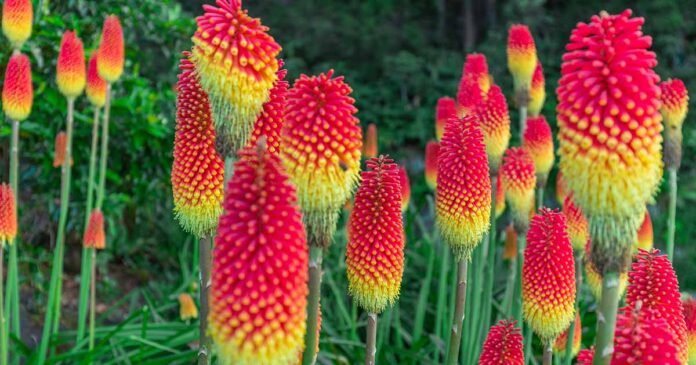Temperature and Humidity
Red hot pokers grow best in moderate to warm temperatures in the range of 60 to 90°F and perform equally well in arid conditions or high humidity.
Fertilizing
Kniphofia plants are moderate feeders and require little additional fertilizing if planted in organically-rich, fertile soil.
In spring after new growth emerges, established specimens benefit from a two-inch side dressing of compost, manure, or worm castings to the root zone, working it in gently with a hand fork.
If desired, you can also apply a slow-release fertilizer in spring to enhance flowering and promote vigor. Use a balanced, all-purpose feed with equal parts NPK such as 5-5-5.
Enhanced All Purpose Plant Food
I use Burpee Enhanced All Purpose Plant Food as it’s suitable for a variety of different species in the garden.
You can find it available at Burpee.
Cultivars to Select
With numerous cultivars to choose from, here’s a short list of some popular options.
Alcazar
Dramatic as a Moorish fortress, ‘Alcazar’ features sturdy bronze flower stems and large racemes of tubular apricot flowers – darkest when in bud then lightening in hue as the blooms open and mature.
Flowering from early to late summer, plants grow 36 to 48 inches tall with a spread of up to 36 inches.
A reliable choice for perennial borders, naturalized settings, or as a striking specimen in gravel, rock, and waterwise gardens. Hardy in Zones 6 to 9.
Bare roots in packs of two, four, or six are available at Eden Brothers.
Fire Dance
Glowing like hot coals, ‘Fire Dance’ is a compact variety that’s ideal for lighting up smaller spaces, producing an abundance of brightly colored flowers from early to late summer.
The eye-catching, bicolored blooms are lemon yellow at the base and transition to bright coral red from the mid-section to the top.
‘Fire Dance’ is a good choice for mixed borders, planters, and rockeries, growing in dense clumps of up to 20 inches tall with a spread of 24 inches. Hardy in Zones 4 to 9.
Bare root plants are available at Burpee.
Pineapple Popsicle
Cool and creamy, ‘Pineapple Popsicle’ is a delightful miniature cultivar boasting multitudes of chartreuse to lemon yellow buds that change to cream and butter yellow as the blooms open and age.
Flowering from midsummer to mid-autumn in mild climates, ‘Pineapple Popsicle’ makes an ideal choice for borders, containers, naturalized settings, and gravel or rock gardens.
The handsome clumps grow 15 to 18 inches tall with a width of 18 to 24 inches. Hardy in Zones 6 to 9.
Plants in one-gallon containers are available at Nature Hills Nursery.
Maintenance
Red hot poker plants are pretty independent once established, but some annual trimming and upkeep helps them to look their best.


Throughout the flowering season, deadhead spent blooms by cutting the flower spikes close to the base.
Deadheading maintains a tidy appearance, encourages reblooming, and curtails unwanted self-seeding.
In regions with mild winters, red hot poker plants are typically evergreen and benefit from a spring cleanup.
Use clean, sharp garden shears to remove dead or dry foliage then cut all stems to three or four inches above the ground to promote new growth.
At the cooler end of their hardness range, they are deciduous, losing their leaves over the winter months. In spring, use snips to clean away all dead foliage, cutting just above the soil line.






